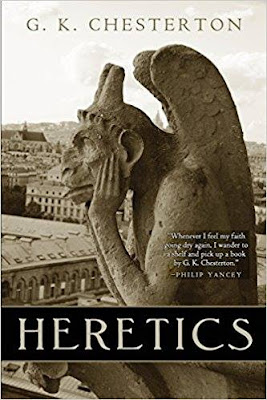
Reading Heretics by G.K. Chestserton is a continuation of my reading the Bibliography from Stratford Caldecott's The Seven Sacraments: Entering the Mysteries of God as personal mystagogy.
I am not new to Chesterton, and I'm sure to no one's surprise, his Heretics inspires much self-reflection on the reader's assumptions and acceptance of modern philosophies, ideas and notions while provoking smiles with his paradoxes and ever-present humor. The book is not a description or refutation of formal Christian heresies— such as Nestorianism or Docetism—but reveals and criticizes the fallacious dogmas and ideals of the modern age including the glorification of progress, scientism, wit & solemnity for their own sakes, technocracy, tourism, aestheticism, modern ritualism, and bad democracy. While the essays within take on specific "heretics" of note from Mr Chesterton's time, each individual addressed is merely a lens by which Chesterton focuses his insight and keen wit.
That he uses figures contemporary to himself, some of whom I had no previous exposure to, could have been distracting, but he does so well in defining their doctrine before addressing its fallacies that specific knowledge of his targets isn't necessary. Otherwise, a quick online search would likely give enough context to those who felt it was necessary.
Overall, while the reading of Heretics was enlightening as an intellectual exploration of ideas and modern dogmas, I did not find it as inspiring in matters of faith as I did Chesterton's Everlasting Man, Orthodoxy, St. Francis, or The Dumb Ox. As I suppose is its purpose, it is useful in helping to distinguish between the sandy, loose soil of "heresy" and the solid rock of Truth and Common Sense, but Chesterton's other above mentioned books do more to build the temple of the Spirit once that mental ground is defined, marked, and cleared, as Heretics will surely help one do.
Comments
Post a Comment